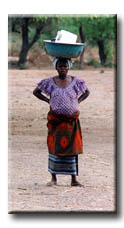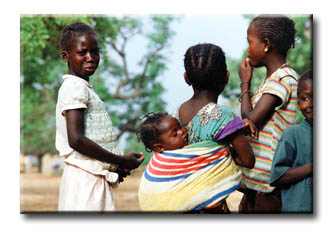Empowering Women
Through Karite
(Any time you see a link, you can click it for more information
on that word or topic)
What's it all about?
In Sahelian Africa, an organization called the Songtaaba Women's Group
has been transforming one of the few economic assets which are controlled
by women - karite
butter - from a less-than-subsistence, informal-sector (or hobby-like)
activity into a formalized and systematized cottage industry. In doing
so, they have created a potential source of not only dramatically increased
incomes, but also new jobs, new skills and opportunities, and the organizational
training for further expansion of women into formal economic activities.
What's the problem?
In the Sahelian countries, the semi-arid regions of Sub-Saharan Africa,
severe deforestation and desertification are taking a great toll in terms
of loss of natural resources, livelihoods and health, and there are few
socially acceptable activities where women can earn their own money. The
manual extraction of karite (shea)
butter is one of the few. Until recently, however, women had no control
over how the product was actually marketed; they were limited to selling
locally the small quantities they made individually or as part of a small
group of individuals.
Burkina Faso is a West African land-locked country in which women constitute
52% of the population of approximately 10 million inhabitants. Burkina
Faso is ranked as one of the poorest countries in the world, and one in
which more women than men live in poverty.
What's the Story?
Songtaaba (which, in the Moore language, means "to help one another")
researches business partners for the sale of its karite butter. It has
a production capacity of 60 tons a month of high quality karite produced
by 350 productives in six provinces of Burkina Faso.
In the West African region, karite butter is used as a foodstuff. It
is also used for making bath soap, laundry soap and other diverse products.
In the US, Europe and Japan, karite butter is imported for use in making
chocolate and baking, for pharmaceutical products, and for cosmetics.
 Traditionally,
the manual transformation of the karite seed into butter is exclusively
a feminine activity in Burkina Faso and, in general, in the rest of West
Africa. Traditionally,
the manual transformation of the karite seed into butter is exclusively
a feminine activity in Burkina Faso and, in general, in the rest of West
Africa.
Efforts to fight against desertification by prohibiting abusive wood-cutting
are also spurred on by karite use. The karite tree, whose economic value
is increasingly well-recognized, is often protected by landowners and
farmers. In areas where severe desertification starts, karite trees are
particularly well protected. Protection of the karite tree also helps
sensitize people to other ways to reduce deforestation, such as by building
improved wood-burning stoves and encouraging artisans to become involved
with their fabrication.
Burkina Faso has great potential to produce and transform karite nuts
for a variety of uses. Karite nut is currently its third most highly exported
agricultural product. However, the production of karite for national and
export sales remains much less extensive than it could be.
How'd This Get Started?
Marcelline Ouédraogo brought "assembly line" scale economics to bear
on karite production when she created her first 30-woman cooperative in
1990. She based this undertaking on existing women's cooperative organizations
which she then built into an enterprise that is democratic and cooperative
– one that is as concerned with raising the status of women as it
is with generating profits.
In the venture, individual participants were no longer responsible for
all steps of the production process. Instead, each woman was assigned
to work on a specific stage: cultivation of the karite; preparation of
the raw material for extraction; oil extraction; further processing of
the karite butter depending on its anticipated end use; and packaging.
In addition, Marcelline Ouédraogo and the members of the Songtaaba cooperative
began marketing the product to larger-volume buyers.
As a result of a currency devaluation in Burkina Faso in 1994, there
were major changes in national and local consumption patterns. Local products
became more sought after due to price increases on products traditionally
imported from Europe.
By 1996 the cooperative had identified a market for karite butter of
approximately five hundred tons with a market value of US $410,000.
Now, women workers are paid according to the task and their availability.
They are given flexible working hours even when they are organized into
teams. For the first time, through the association, women members are
able to gain access to a line of credit. The association also established
a special fund to help when members experience particular difficulties
such as a death in the family, medical emergencies or the need for help
with school fees.

Cash flow was typically a major problem that hindered women's activities.
Songtaaba managed to obtain a loan from a credit union to support each
collection campaign.
To market the karite products produced by the Cooperative, two kiosks
were created to display and to sell its products. These displays are also
aimed at increasing Songtaaba's visibility and publicity in Ouagadougou,
the capital city. For some clients, products are delivered at the workplace
or at home and payments of such orders are collected at the end of each
month.
To guarantee the women's income, they take turns doing the work and
are paid on a per-task basis. Songtaaba's activities are spreading throughout
the country and women's groups have been invited by their counterparts
in neighboring countries to train them to handle the whole process.
Two thousand women have been trained throughout Burkina Faso to treat,
collect and transform the karite butter and related products. In order
to ease the tasks of women producers, karite products are processed using
a semi-industrial machine in urban areas, and with manual presses in rural
areas.
How's the Project Organized?
Songtaaba's organizational structure includes a Permanent Secretariat,
a General Assembly, a Board of Directors, and management committees. The
secretariat is composed of a sociologist in charge of program/project
implementation, four saleswomen, a secretary, a driver and a security
person. Their monthly salaries are paid from Songtaaba's funds. The General
Assembly has the higher management decision-making role and is comprised
of women producers. Local branches are composed of grassroots village
groups that are members of the General Assembly. The Board of Directors
is the executive body of the organization. Songtaaba also includes management
committees. These positions are held by unpaid volunteers.
In keeping with the Platform of Action of the Beijing Fourth World Conference
on Women, Songtaaba emphasizes the participation of women in economic
activities to improve their social conditions and their educational level,
to reduce their fertility rate, to increase their life span, and to reduce
poverty. To further these objectives, Songtaaba gives training in management,
in literacy, in family planning, and in evaluation follow-ups, which complement
income-generating activities.
How's it Going?
The project continues to be successfully underway. The impact of Songtaaba's
initiative is multiplying and growing, profiting all who participate or
operate in the Karite Network (women and men) and who benefit from all
positive repercussions.
Songtaaba is now seeking to create six micro-enterprises of production
of karite butter and of other products, such as the soumbala, peanut butter,
dry and fresh vegetables and fruits, and karite butter soap.
Other activities undertaken are to build the capacities of Songtaaba's
members: Installation of purification systems for handling water used
in production and the creation of a sewing center for twenty underprivileged
girls.
Building on her experience with Songtaaba, Marcelline Ouédraogo organized
the Collective of Producer Associations of Karite Butter and Other Products,
which now has 350 women members in five provinces. The associations, in
turn, work cooperatively: for example, some of them focus exclusively
on supplying Songtaaba with raw material for processing.
Under Songtaaba's organizational structure and Marcelline Ouédraogo's
initiative, she represents the association in the Orientation Committee
of the Ouagadougou-based Karite Project (Projet Filiere Karite) that has
been set up by a Canadian agency.
Songtaaba has recently welcomed its first Malian Cooperative to the
Collective of Producer Associations of Karite Butter and Other Products.
Marcelline Ouédraogo now has a three-part objective. First, she wants
to spread this form of organized approach to other West Africa countries.
Second, she wants to upgrade the production process, starting with the
introduction of an oil press machine. And third, she wants to market her
product directly to overseas buyers, who she sees as her largest and least-tapped
market.
In addition, Marcelline Ouédraogo is working with a local research institute
to develop a new hybrid of the karite tree that will bear fruit at a much
faster rate.
The person:
Marcelline Ouédraogo, an Ashoka Fellow,
was born in 1958 and became involved in women's issues when in secondary
school. There she organized activities supporting girls' schooling and
opposed forced and early marriages and genital excision/mutilation. After
graduation, Marcelline went to work for a telecommunications company.
She is married, with three children and four adopted orphans.
|













